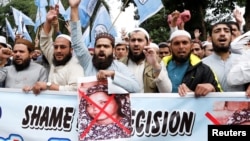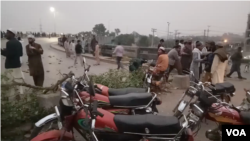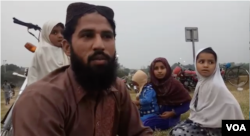A Pakistan government team negotiated a deal late Friday with Islamist groups, apparently defusing three days of crippling protests over the Supreme Court's acquittal of a Christian woman accused of blasphemy against Islam's holy prophet.
The government agreed under the deal to take "legal measures" to prevent the woman from leaving the country while the court hears a petition against the verdict.
Members of a group called Tehreek e-Labbaik ya Rasool Allah, or TLYR, blocked roads in cities across the country and clashed with police overnight. In a cellphone video of one such clash, a protester could be seen firing a pistol.
The protests started Wednesday morning after the highest court in the country upheld Asia Bibi’s appeal against a guilty verdict. She had been facing death row since 2010 under Pakistan’s controversial blasphemy laws.
According to Bibi, she was falsely accused after a heated argument with other women who refused to drink water she had given them because she was Christian.
Other religious groups also held demonstrations Friday, albeit peacefully.
The government banned television coverage of protests linked to the issue and suspended cellphone service in several cities throughout the day to contain the crowds.
Schools across the country were closed and many workers stayed home. Traffic was light and unpredictable, with roads blocked either by TLYR members or the police in some places.
People turned to Twitter, Facebook, and other social media forums as news on dozens of television channels in Pakistan was scant. The rumors and unconfirmed reports that followed caused anxiety among those who had relatives or friends traveling or stuck away from home.
Media outlets and foreign journalists often used cellphones rather than cameras to acquire footage of the demonstrations after several instances of TLYR members beating up cameramen or breaking their equipment.
While the protests were spread out and none of the spots had more than a few thousand people, those present seemed charged and ready to fight.
“If the police come here we will hit them with this baton. We are here for Islam. If they conduct an operation, we are willing to die. We will not retreat,” said an 18-year-old man wielding an iron baton, who had come alone from another city to attend the protest in the capital, Islamabad.
Several people brought their children to the protests despite the risk of security operations, which could include tear gas, water cannons, a baton charge, or rubber bullets.
One man, who brought four young daughters and an infant to a rally in Islamabad, said he planned to stay despite the risks to his children.
“All of my children, my parents, my whole family, is for the prophet,” said Mohammad Zahid Niazi.
Earlier in the week, TLYR leaders called for the killing of Bibi and the Supreme Court justices who passed the acquittal judgment, an overthrow of the elected government, and a mutiny in the army against its chief. This prompted Prime Minister Imran Khan to respond with a strongly-worded message on national TV.
By Thursday morning, however, the government seemed to have softened its stance, announcing it would negotiate for a peaceful end to the protests.
Thursday night, the leader of TLYR, Khadim Hussain Rizvi, tweeted that the negotiations, which included government ministers and an army general from Pakistan’s intelligence agency ISI, had failed. He called on his followers to bring the country to a halt Friday.
Information Minister Fawad Chaudhry tweeted Friday morning, though, that the government was still negotiating with TLYR.
The spokesman for Pakistan’s military, Asif Ghafoor, told Pakistan’s state TV Friday morning the situation should be resolved peacefully.
“Both sides should talk to each other. It should not reach the stage where the armed forces have to be called,” he said.


